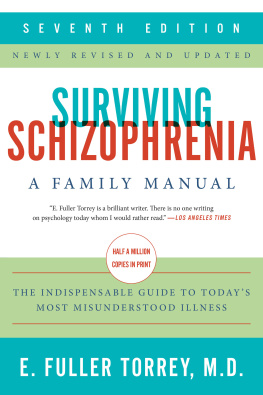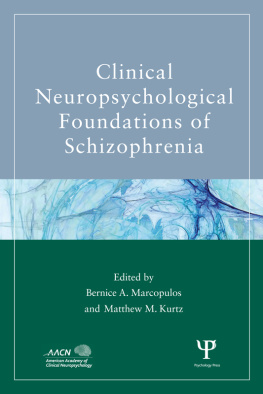SCHIZOPHRENIA

SCHIZOPHRENIA
A Brother Finds Answers in Biological Science
Ronald Chase

2013 The Johns Hopkins University Press
All rights reserved. Published 2013
Printed in the United States of America on acid-free paper
9 8 7 6 5 4 3 2 1
The Johns Hopkins University Press
2715 North Charles Street
Baltimore, Maryland 21218-4363
www.press.jhu.edu
Chase, Ronald.
Schizophrenia : a brother finds answers in biological science / Ronald Chase.
pages cm
Includes index.
ISBN 978-1-4214-1090-6 (hardcover : alk. paper) ISBN 978-1-4214-1091-3 (pbk. : alk. paper) ISBN 978-1-4214-1092-0 (electronic) ISBN 1-4214-1090-7 (hardcover : alk. paper) ISBN 1-4214-1091-5 (pbk. : alk. paper) ISBN 1-4214-1092-3 (electronic)
1. Schizophrenia. 2. Schizophrenia in adolescence. 3. Schizophrenics Family relationshipsUnited States. 4. Neuropsychiatry. I. Title.
RC514.C463 2014
616.898dc23 2013001717
A catalog record for this book is available from the British Library.
Special discounts are available for bulk purchases of this book. For more information, please contact Special Sales at 410-516-6936 or specialsales@press.jhu.edu.
The Johns Hopkins University Press uses environmentally friendly book materials, including recycled text paper that is composed of at least 30 percent post-consumer waste, whenever possible.
For Zanna and Aaron
They too are siblings
Contents
Acknowledgments
I thank Irving Gottesman, Ph.D., Andrew Shaner, M.D., and Rajiv Tandon, M.D., who provided me with valuable suggestions after reading an early version of the manuscript. Many thanks also to Jacqueline Wehmueller of the Johns Hopkins University Press for her enthusiasm, good judgment, and superb editing. My wife, Dorothy Chase, encouraged me and, in so many other ways, kept me going.
SCHIZOPHRENIA
 Prologue
PrologueSchizophrenia is an illness that frightens and fascinates, but few people know much about it. Yes, it is generally known that schizophrenia is a serious mental illness. And, yes, people know that occasionally a person who commits a violent act can escape criminal penalties if he or she is proved to have schizophrenia. But the symptoms of the disease, who gets it, and its fundamental nature remain blurred, even in the minds of people who have known its victims. Medical science has itself been slow to understand the disease. The history of psychiatry is filled with wild speculations, false hypotheses, and ill-conceived treatments, which have led people to entertain fuzzy and sometimes romantic ideas, for example, that schizophrenia is caused by bad mothering or Gods will, that it is simply an extreme form of social deviance, or even that it is a good thing because it comes with creativity.
After centuries of ignorance, those who seek to learn the facts are now confronted with an entirely different problem: the overwhelming number of scientific and medical publications. In 1958, the year in which my own brother, Jim, became ill, 474 journal articles were published on the subject of schizophrenia. Thereafter, the pace of publication steadily quickened until, by 2012, the annual total was 5,766 articles. There are now more than 100,000 English-language articles directly related to schizophrenia (dating from 1930 to 2013), most of which are readily available to academics and researchers on the Web.quantity of research, the science of schizophrenia remains unsettled. Making sense of the staggering amount of information means sifting through reams of material to separate the solid research from the shoddy research, recognizing false leads, and reconciling contradictions. With an average of around 100 new publications appearing every week, keeping up to date can be daunting.
There is another difficulty in learning about schizophrenia: only those who suffer from it truly know what it is like to have the disease. With most other illnesses, patients can describe their symptoms in detail, and they can report on the subjective feelings that accompany them. Schizophrenia robs its victims of the insights and the verbal skills required for such descriptions. Also, stigma silences those who might otherwise speak out.
Because of my dual roles of loving brother and professional biologist, I have been motivated to write a book that gives a more complete view of schizophrenia, one that presents in alternating chapters both a personal story and an objective account. The objective chapters that cover the medical and scientific facts of schizophrenia bear titles in the form of questions. These are the questions that I struggled with over the course of my brothers life and that I needed to answer for myself. I assume that many readers will have been seeking answers to the same, or similar, questions.
The chapters that tell the story of my brothers illness follow an irregular chronology that omits large chunks of time. In part this is because I lived far away from Jim during most of my adult life and saw him only intermittently. But also, I decided it would be better to look more closely at a few pivotal events rather than attempt a narrative that would include every twist and turn of his illness. Because I was not in constant contact with my brother, I witnessed only a few of the episodes of psychosis during which he suffered from paranoiac delusions. Whereas bizarre or dramatic behaviors are often the focus of biographical accounts of schizophrenia, in my brothers case, and I suspect in most other cases, it is the crippled navigation of everyday life that is more representative. Thus, I hope that the biographical chapters in this book will reveal both the nature of the illness and the character of the person who was my brother.
I cannot claim that Jim represented a typical case of schizophrenia, for the simple reason that I do not believe there exists any typical case. Nor was his a stereotypical case, by which I mean a case involving horrible acts of violence, as the popular (mis)conception would have it. As I will explain, schizophrenia is a poorly defined disease that takes many different forms. Jim was essentially a quiet and unobtrusive person. Most of the time, except during the occasional relapse, his medications worked well in controlling the worst manifestations of his disease, the so-called positive symptoms of schizophrenia, which in Jims case included delusions, disorganized speech, and auditory hallucinations. They failed, however, to relieve his so-called negative symptoms, which included social withdrawal, the absence of motivation, and depression. Whether Jims symptoms and the progression of his illness match those of any other persons with the same illness is less important than the fact that all people with schizophrenia suffer tragically. It pains me to know that Jim never had a serious relationship with a woman, had no children, was unable to continue his promising career, and so much more.
Schizophrenia is a disease that affects not only the person who has the disease but also that persons family. Thus, my brothers story is also my own story, and my mothers and fathers (I have no other siblings). Again, the particulars of my familys experiences will differ from those of other families, but the burden of guilt and the anguish of unanswered questions will be familiar to everyone whose loved ones have suffered from schizophrenia.
Next page











 Prologue
Prologue